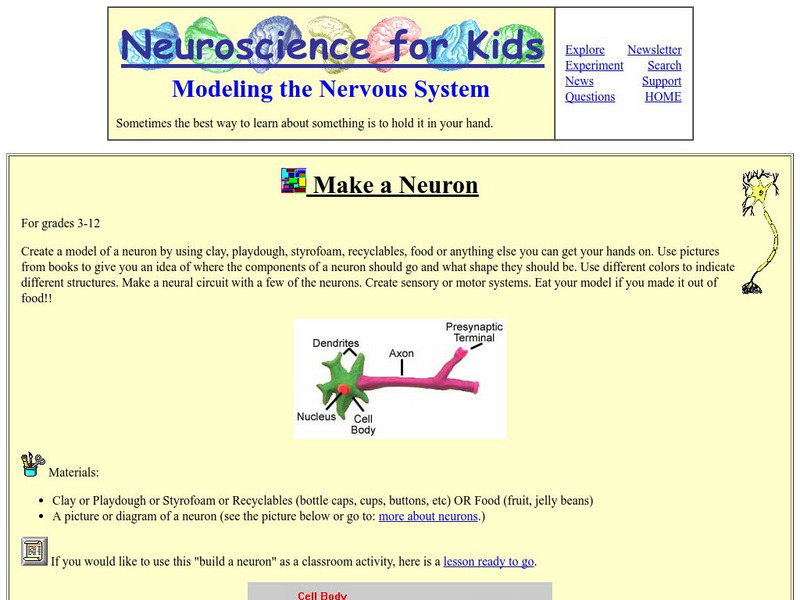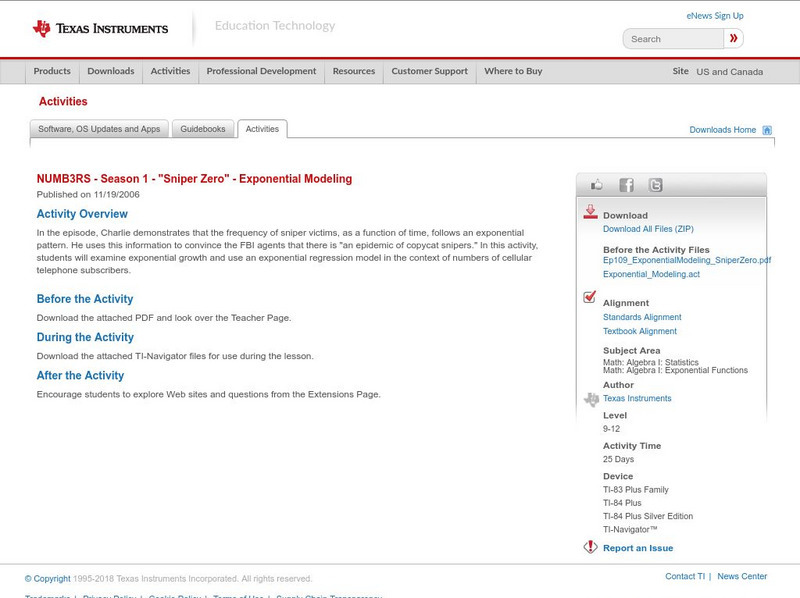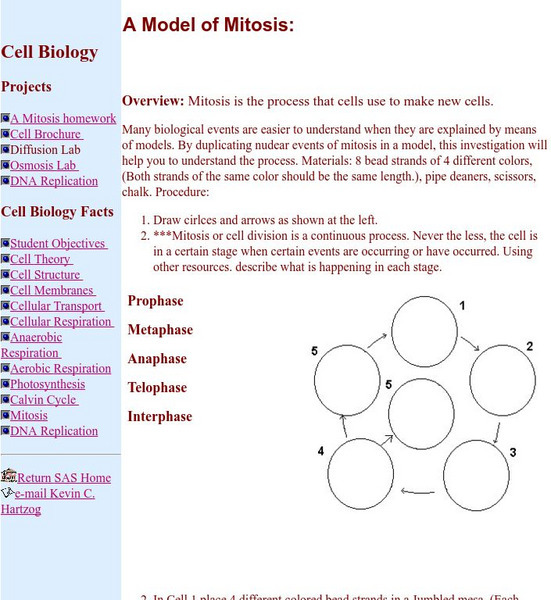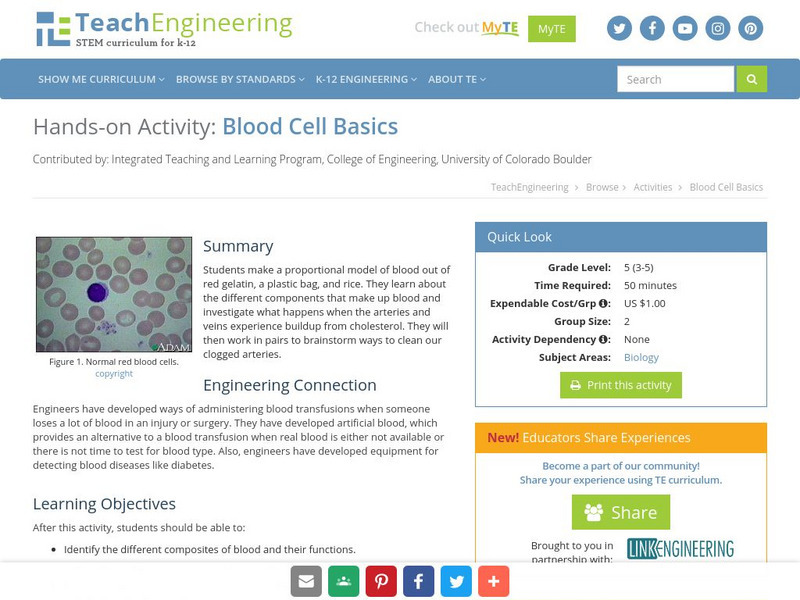Science Education Resource Center at Carleton College
Serc: Animal and Plant Cell Models and Cell Tour Given to Life Science Students
A biology class is divided into two groups: one an animal cell, and the other one, a plant cell. They are given a list of cell organelles to research and construct in their 9 M X 9 M model. Students must organize and assign duties,...
Enchanted Learning
Enchanted Learning: Plant Cell: Animal Cell Anatomy
This is a thorough site which contains a glossary of plant/animal cell anatomy terms. Diagrams of both cells are included along with worksheets to label.
Cells Alive
Cells Alive!: Plant, Animal, and Bacteria Cell Models
Find animated diagrams that describe both eukaryotic cells and prokaryotic cells. There are models for animal, plant, and bacteria cells.
Science Education Resource Center at Carleton College
Serc: Best Edible Model of a Cell Contest
Students build a model of a cell using all edible materials. Students must do an oral presentation of the model.
ibiblio
Ibiblio: Virtual Cell Web Page
A teacher- and student-contributed website of 3-D models and explanations of cell structures.
PBS
Pbs Teachers: Changing Your Mind: Nerve Cell Infomercials
Build nerve cell models in cooperative groups, and articulate the structure and function of nerve cells to explore the nervous system. Describe specific elements of human physiology by "advertising" the nervous system in nerve cell...
Alabama Learning Exchange
Alex: Edible Cell
As part of the study on Life Processes, the young scholars will watch a video clip at Cells Alive to see a model of the cell and its components. The students will use edible products to create an animal cell. Each product will represent...
Ohio State University
Ohio State University: Cell Membranes
Diagrams and animations help you understand the basics of cell membrane structure and function.
TeachEngineering
Teach Engineering: Cell Membrane Color Sheet and Build a Cell Membrane
Students color-code a schematic of a cell and its cell membrane structures. Then they complete the "Build-a-Membrane" activity found at http://learn.genetics.utah.edu. This reinforces their understanding of the structure and function of...
Vision Learning
Visionlearning: Cell Biology: Introduction to Biological Membranes
Explanation of complex and dynamic cell structures that are selective in regards to what is allowed to enter and exit cells.
University of Washington
University of Washington: Modeling the Nervous System: Making a Neuron
Use this site for lots of different ideas on how to make a model of a neuron.
BiologyWise
Biology Wise: Simple Steps on How to Build a Plant Cell Model
Describes the steps in how to make a model of a plant cell using simple materials and sweet foods like jello and candy.
BiologyWise
Biology Wise: Tips on How to Make a Plant Cell Model
Describes the steps for making a model of a plant cell in two different ways. The first way uses mostly sweet foods and the second way uses a shoebox, clay, and simple materials.
Cells Alive
Cells Alive: Bacteria Cell Model
Investigate the similarities and differences between gram positive and gram negative bacterial cells.
Science Education Resource Center at Carleton College
Serc: Comparing the Simple Structure of Plant and Animal Cells
Students use guided scientific observation using a collection of models, visual material, and microscope slides to identify cell organelles. Then they demonstrate their understanding of the parts/characteristics of cells by identifying...
Illustrative Mathematics
Illustrative Mathematics: G Mg How Many Cells Are in the Human Body?
About how many cells are in the human body? The purpose of this task is for students to apply the concepts of mass, volume, and density in a real-world context. Aligns with G-MG.A.2.
Texas Instruments
Texas Instruments: Numb3 Rs: Exponential Modeling
Based off of the hit television show NUMB3RS, this lesson introduces students to exponential equations, their graphs, and their application in the real world. The lesson is framed in the context of the number of cell phone users for a...
National Health Museum
Access Excellence: Travel Brochure for a Cell
This activity offers an alternative to cell models to help the students to understand cells and their functions. Students are required to produce a travel brochure that describes a plant or animal cell as if it were a large exhibit or...
National Health Museum
Access Excellence: Modeling Limits to Cell Size
Why can't cells continue to grow larger and larger to become giant cells, like a blob? Why are most cells microscopic in size? Find out answers to these questions through this "hands-on" activity that simulates the changing relationship...
Other
Ohio Department of Education: Cell Division and Differentiation
In this lesson, students use hands-on activities and journaling to learn about the process of mitosis, meiosis and cell differentiation. Hands-on activities include modeling of the mitosis and meiosis processes with model building and...
National Health Museum
Access Excellence: Cells on a Ceiling
In this lesson plan site, each student is assigned a cell part to research, create, and place inside of a clear plastic drop cloth (the cell) the size of one-half of the classroom ceiling.
Other
A Model of Mitosis
Make a model of mitosis as a first step to understanding the process. A vocabulary list with clear definitions is included in this site.
TeachEngineering
Teach Engineering: Blood Cell Basics
In this lesson students learn about the circulatory system and how it relates to engineering. Then in a hands-on activity they create a model of blood. Students also act out cholesterol in a blocked artery and look at blood cell in a...
TeachEngineering
Teach Engineering: Active and Passive Transport: Red Rover Send Particles Over
Students compare and contrast passive and active transport by playing a game to model this phenomenon. Movement through cell membranes is also modeled, as well as the structure and movement typical of the fluid mosaic model of the cell...

















